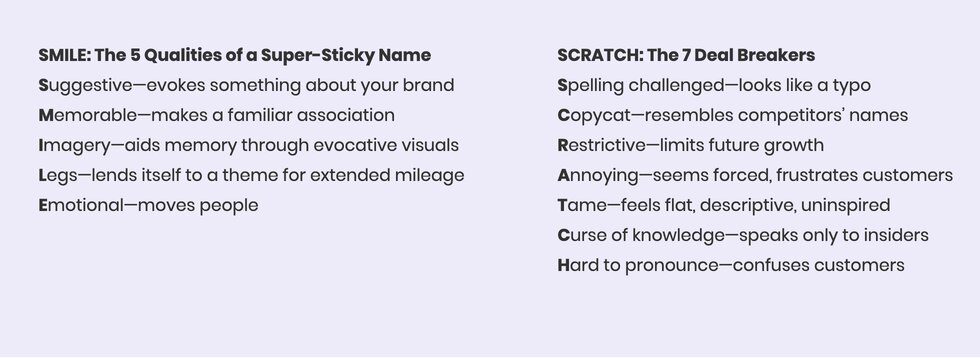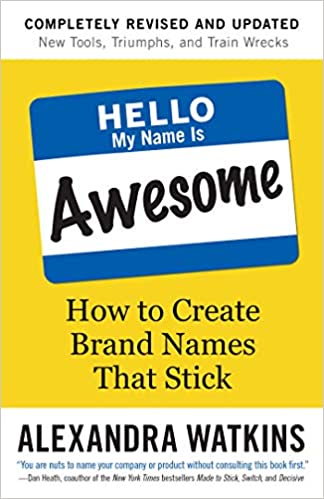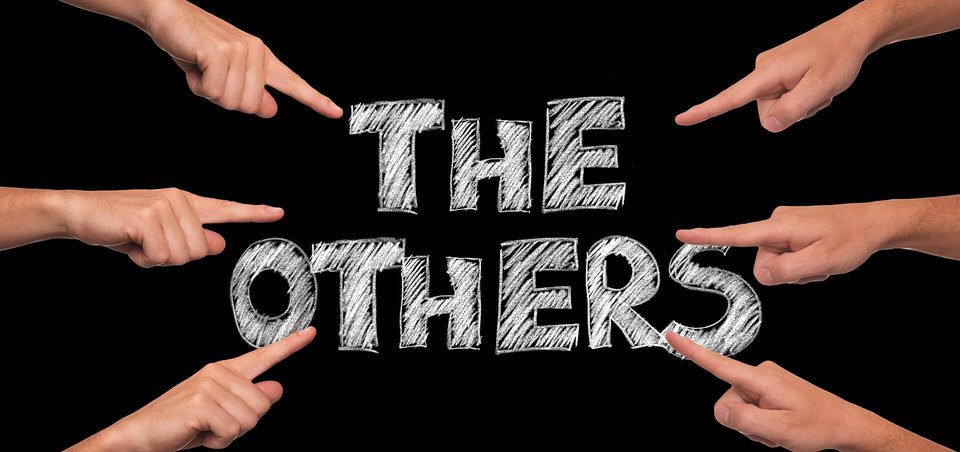In Hello, My Name Is Awesome, naming consultant Alexandra Watkins explains how anyone—even noncreative types—can create memorable and buzz-worthy brand names. At the core of the book is Watkins’s SMILE and SCRATCH Test.
We connect with the most powerful brand names because they are based on familiar concepts we understand and appreciate.
A great name makes you SMILE because it is
Memorable Makes an Association with the Familiar
According to the latest research in cognitive psychology, we remember things that can easily be merged into our existing knowledge base. One of the basic mechanisms of memory is association. The stickiest names are associated with words and concepts that are already familiar to us.
- Suggestive—evokes something about your brand
- Memorable—makes an association with the familiar
- Imagery—aids memory through evocative visuals
- Legs—lends itself to a theme for extended mileage
- Emotional—moves people
The most powerful names get noticed, get buzz, and get sales because they connect with consumers on an emotional level, making us feel good.
A bad name, on the other hand, makes you SCRATCH your head because it is
- Spelling challenged—looks like a typo
- Copycat—resembles competitors’ names
- Restrictive—limits future growth
- Annoying—seems forced, frustrates customers
- Tame—feels flat, descriptive, uninspired
- Curse of knowledge—speaks only to insiders
- Hard to pronounce—confuses and distances customers
Anytime you have to make excuses for your name, you’re apologizing for it. And when you apologize for your name, your brand is devalued.
Just like jumping into a relationship before you really get to know someone, you may not discover the faults of a poorly chosen name right away. You’ll be too caught up in everything else you need to do to launch a new product or company. It won’t be until after you’ve started to build a future together that you realize your name “has issues.” And you’ll be forced to find ways to justify it.

SMILE
Suggestive Evokes Something about Your Brand
A name can’t be expected to say everything, but it can suggest something about your brand. Not in an overly obvious way but in a way that activates the imagination.
Memorable Makes an Association with the Familiar
According to the latest research in cognitive psychology, we remember things that can easily be merged into our existing knowledge base. One of the basic mechanisms of memory is association. The stickiest names are associated with words and concepts that are already familiar to us.
Imagery Aids Memory through Evocative Visuals
Names that are associated with images make a strong impression and are hard to forget. Think of someone you’ve met in your lifetime who has a memorable first name.
Legs Lends Itself to a Theme for Extended Mileage
To get the most out of your name, give it legs. A name with a theme will lend itself to wordplay, letting you get more mileage out of it. Names with legs provide endless “verbal branding” opportunities.
Emotional Moves People
According to Forrester Research, 50 percent of every buying decision is driven by emotion. Not only do we buy things that make us feel good, but we are also inclined to buy things with names that make us feel good.
Scratch – The 7 Deal Breakers
When you’re starting out with a blank slate, don’t weaken your name with any disadvantages. Cr8tiv spellings, unintelligible words, and unfamiliar expressions may make you unique, but more often than not these names can spell trouble.
If you need to help someone spell, pronounce, or understand your name, you are essentially apologizing for it. Making excuses for your name devalues your brand.
Spelling Challenged Looks Like a Typo
If your name isn’t spelled like it sounds, it’s a mistake. Spelling your brand name in a nonintuitive way isn’t clever; it’s a cop-out. Sure, it’s tempting to spell your name “yooneek.ly” so you can nab an available domain name. But spelling-challenged names will forever frustrate your customers, embarrass your employees, and annoy journalists, bloggers, and proofreaders.
Copycat Resembles Competitors’ Names
Hijacking another company’s original idea isn’t good for your business reputation or for building trust with your customers. Copycat names are lazy, lack originality, and blatantly ride on a competitor’s coattails. Plus, because they could cause customer confusion, you open yourself up to trademark infringement.
Restrictive Limits Future Growth
Look into your crystal ball and imagine what your company might grow into down the road. Plan ahead, and choose a name wide enough to cover you in the future. The name Amazon suggests “enormous.” Jeff Bezos chose the name because it conjures up images of one of the world’s largest rivers, and he envisioned his company being unfathomably large, even when he founded it in 1994. No matter what it sells or how Amazon evolves, the name will always fit. Can you imagine how stunted the company would be if it were named Book Barn?
Annoying Seems Forced, Frustrates Customers
If you invent a new word for your name (e.g., Pinterest or Groupon), make sure it doesn’t sound too contrived or unnatural. Mashing two words together or mixing up a bunch of letters to form a new word is tricky and often sounds strained.
Barely changing the last few letters of a word to make a new word will almost always land your brand in the lame-name hall of fame. Learnia, Washio, Innova, Natura, and Evolva each show a complete lack of effort and creativity.
Tame Feels Flat, Descriptive, Uninspired
Overly descriptive names are weak because they don’t challenge, excite, or mentally stimulate us. They require little imagination. And they reveal nothing about the personality of your brand (other than exposing your lack of creativity).
Curse of Knowledge Speaks Only to Insiders
No one is more of an expert on the company or product you are naming than you are. But when you’re communicating with potential customers who are unfamiliar with your world, your insider knowledge can become a curse. We can’t unlearn what we know, so we find it extremely difficult to think as a newbie. We talk in acronyms, internal shorthand, code words, and industry jargon, all of which are foreign to outsiders. Don’t alienate your potential customers by cursing your name.
The curse of knowledge has been described as “a cognitive bias in which better-informed people find it extremely difficult to think about problems from the perspective of lesser-informed people.
Hard-to-Pronounce Confuses and Distances Customers
Having a difficult-to-pronounce brand name can put a company at a disadvantage. According to Daniel M. Oppenheimer, a psychology professor at the UCLA Anderson School of Management, stocks with hard-to-pronounce names are less likely to be purchased, and politicians with difficult names are more likely to lag in polls. On the flipside, a catchy name can boost the visibility of a candidate.
The Creative Brief
Before you jump into the fun part, brainstorming names, it’s essential to complete what’s known as a “creative brief,” aka “the brief.” Do not skip this step. The brief will help you define exactly what your brand is and what you want the name to convey, both in message and personality. Equally important, it will help you stay focused and prevent you from choosing the wrong name.
Think of the brief as the ingredients list of everything you need to cook up the perfect name: goal of the assignment, information on your target audience, consumer insights, desired brand positioning, competitors’ names, words to explore and avoid, and more.
Recommended Tools
Domain Name Suggestion Tool
NameStudio – www.namestudio.com
Domize – www.domize.com
Rhyming dictionary, RhymeZone.com
Phrase Thesaurus (phrases.org.uk/phrase-thesaurus),
FantasyNameGenerators.com: More than 1,200 name generators, description generators, and guides. Dig deep.
IdiomConnection.com: Phrases and idioms neatly categorized by topic, including animals and body parts idioms.
NameBerry.com: Baby names that can be searched by meaning, such as “Names that mean strength.”
PowerThesaurus.com: Crowd-sourced associated words, ranked and neatly organized.
Synonyms.com: Words that mean the same but are different.
VisualThesaurus.com: For those who think visually, a comprehensive thesaurus and dictionary of more than 145,000 words that you can explore using an interactive map.
Visuwords.com: A graphical dictionary to view words’ meanings and associations with other words and concepts.
WordAssociations.net: An associative dictionary, an explanatory dictionary, and a picture dictionary.
Wordfind.com: Use to find words that start with the same letter. Excellent for making alliterative names.
WordGameDictionary.com: Use to find short words to help you nab an available domain name.
Trademarking – https://www.uspto.gov/
TRADEMARKING
US Patent and Trademark Office, “Trademark Basics,” https://www.uspto.gov/trademarks-getting-started/trademark-basics
International Trademark Association, https://www.inta.org
Service Providers
DOMAIN NAMES
GoDaddy, GoDaddy.com
Name Studio, NameStudio.com
Words
- Thesaraus – www.thesaurus.com
- Urban Dictionary – www.urbandictionary.com
- Free Dictionary – www.freedictionary.com
- Ranker – www.ranker.com
Images
- Shutter Stock – www.shutterstock.com
- Google Images – images.google.com
DYI TRADEMARK SEARCHES
Trademarkia, Trademarkia.com
US Patent and Trademark Office, USPTO.gov
TRADEMARK SCREENING
Tessersa Trademark Screening, Tessera.bz
Wilcox IP, WilcoxIP.com
TRADEMARK EXPERTS
Lara Pearson, BrandGeek.net
Draeke Weseman, TalkToDraeke.com
TRANSLATION CHECKING
TravelingBrand, TravelingBrand.com
BrandedTranslations, BrandedTranslations.com
LEGAL INCORPORATION
Startup Documents, StartupDocuments.com
LawDepot, LawDepot.com
All the Best in your quest to get Better. Don’t Settle: Live with Passion.



1 Comment
Pingback: On Boundaries. – Lanre Dahunsi